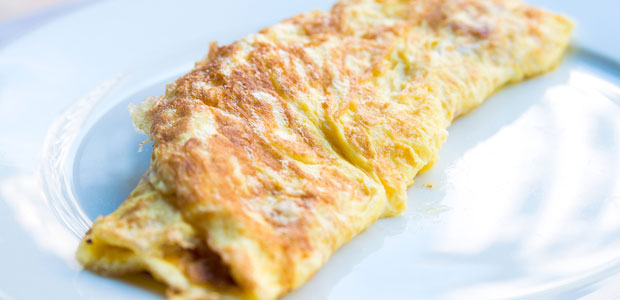Advertisement
How to Cook a Better Omelette
The omelette is one of the first things students learn to make in culinary school. Although it seems like an easy dish to cook, its light, airy texture is something that takes practice—and patience. There are many different types of omelettes, including the traditional French omelette, which contains only eggs and herbs; the Denver omelette, … Continued

The omelette is one of the first things students learn to make in culinary school. Although it seems like an easy dish to cook, its light, airy texture is something that takes practice—and patience.
There are many different types of omelettes, including the traditional French omelette, which contains only eggs and herbs; the Denver omelette, which often contains diced ham, green peppers, and onions, and the Indian omelette (a.k.a. Masala omelette), which is made with a variety of regional spices, onions, green chilies, and cilantro. Pretty much every culture has its own unique take on the omelette, so no matter where you are in the world you can count on an egg-y plate of deliciousness.
The best part about the omelette is that it’s so versatile. Dress it up or dress it down, you can serve an omelette at an afternoon brunch or whip one up yourself after a sweaty workout at the gym. Further, you can put pretty much anything in an omelette and it’s going to taste good. Try gruyere and caramelized onions, or feta, spinach, and grape tomatoes. Heck, throw in whatever you’ve got sitting in your crisper and you don’t even have to go to the grocery store.
So now that you’re drooling over the thought of a gruyere and caramelized onion-stuffed omelette, here are a few tips for making sure that omelette tastes as good as you imagine.
- Choose a pan that is approximately 8 inches in diametre for a 1 to 3 egg omelette. Make sure it is relatively shallow with sloping edges.
- For a fluffy omelette, whisk water into the eggs, not milk. Water evaporates in the hot pan, creating air pockets for a lighter omelette.
- For a dense omelette, use milk, which will add creaminess but won’t have the same airiness as an omelette made with water.
- Heat the pan over medium heat until a drop of water rolls around the pan rather than bursts into steam immediately.
- Make several individual omelettes rather than one big one as smaller ones will be fluffier and easier to handle.
Stuck on what to put in your omelette? Try one of these simple recipes.





